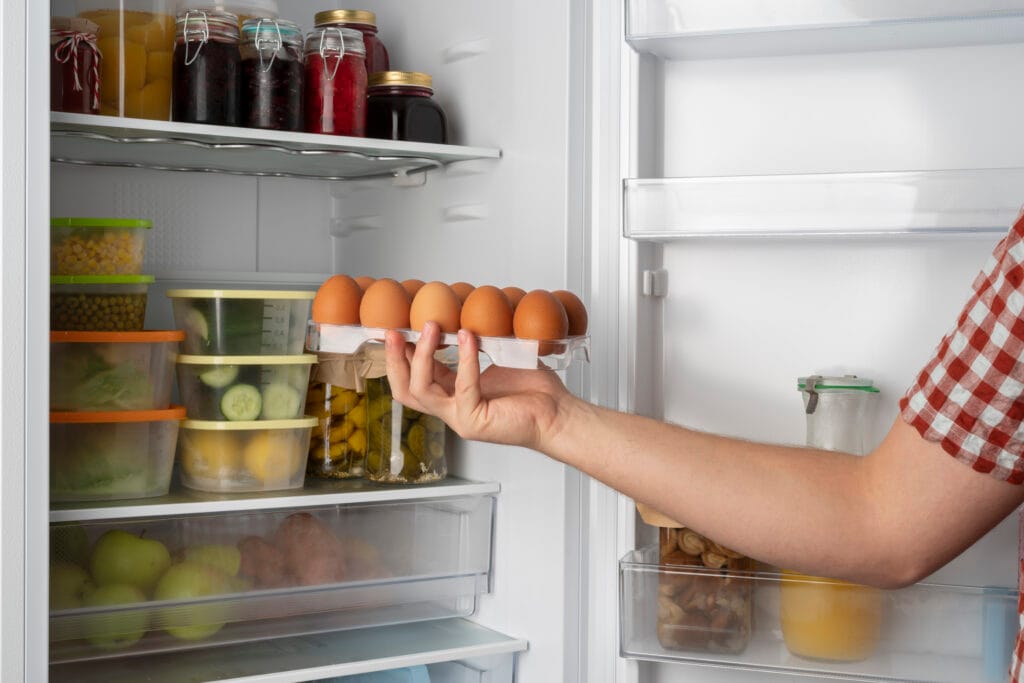Eggs—these little ovals of joy are a kitchen staple! But have you ever wondered how long they can sit out without becoming a risky snack? This is more than a culinary curiosity; it’s about keeping yourself and your family safe from foodborne illnesses. Let’s crack into the details. 🥚
Understanding Egg Freshness
Why Egg Freshness Matters
Fresh eggs not only taste better but are also safer. Did you know fresh eggs are perfect for recipes like the delicate Yogurt Flatbread Recipe that require excellent structure? They hold their form and enhance flavor.
- Fresh eggs have a firm white and a prominent yolk that sits up nicely in the pan.
- Older eggs? Not so much. They spread out and lose that perfect sunny-side-up appeal.
So, knowing how long eggs can sit out directly impacts your kitchen game and your health.
According to the United States Department of Agriculture (USDA), consuming fresh eggs ensures a lower risk of foodborne illnesses like Salmonella.
The Science Behind Egg Spoilage
Ever noticed how an egg’s shell feels tough but is surprisingly porous? This design lets oxygen in and moisture out over time, accelerating spoilage. When eggs are left out at room temperature, especially in warm or humid environments, the bacteria growth skyrockets.
- At 40°F or below, bacteria growth slows dramatically.
- At room temperature (around 70°F), the bacteria can double every 20 minutes! 😱
That’s why understanding egg storage is key to preventing waste and ensuring safety.
Guidelines for Storing Eggs
Ideal Temperature for Egg Storage
Keeping eggs refrigerated at a consistent temperature below 40°F is the golden rule. The fridge acts as your egg’s protective shield, slowing down bacterial growth and preserving freshness.
📖 Pro Tip: Store eggs in their original carton. It helps reduce moisture loss and protects them from absorbing odors from other foods (ever tasted an onion-flavored omelet? Ew!).
Do Eggs Need Refrigeration?
This question stirs up a classic debate. In the U.S., eggs are washed before being sold, removing a protective coating called the “bloom.” This makes refrigeration non-negotiable. In contrast, many European countries leave this coating intact, so their eggs are safe at room temperature for longer.
Here’s the takeaway: If your eggs come from a store in the U.S., they must go in the fridge. 🧊

Factors Influencing How Long Eggs Can Sit Out
Temperature and Humidity
Temperature and humidity are the ultimate puppet masters in the egg storage game. High temperatures speed up spoilage, while humidity can encourage mold growth on the shell.
- Ideal humidity: Around 75%
- Dangerous temperature zone: Anything above 40°F for more than 2 hours
It’s a balancing act to ensure your eggs remain usable.
Egg Shell Integrity
A cracked shell? That’s a no-go. Cracks allow bacteria to enter, making the egg unsafe even if it hasn’t been out long. Always inspect your eggs before using them.
Type of Egg: Washed vs. Unwashed
Unwashed eggs with their natural bloom intact can last longer at room temperature compared to washed eggs. If you’re buying farm-fresh eggs, they might have this extra layer of protection. But don’t rely on it indefinitely!
Block Quote:
“A cracked egg is like an open invitation to bacteria. Always err on the side of caution and toss it out if the shell is damaged. Your health is worth more than a couple of cents!”
This wraps up the first part of our egg-sploration! 🐣 In this section, we dived into the basics of egg freshness, the science of spoilage, and how proper storage can save you from culinary and health disasters. Let me know when you’re ready to move on to Part 2, where we’ll explore the specific risks of leaving eggs out and debunk common myths. 🚀
How Long Can Eggs Sit Out?
General Recommendations for Room Temperature
So, how long is too long for eggs to sit out? The USDA recommends that eggs shouldn’t be left at room temperature for more than 2 hours. If it’s a particularly warm day (above 90°F), this window shrinks to just 1 hour.
Why so strict? Because bacteria like Salmonella thrive in the “danger zone” between 40°F and 140°F. This is the perfect breeding ground for pathogens that can lead to food poisoning. 🤢
Want to ensure your ingredients remain fresh for recipes like Zucchini Cake? Proper egg handling is vital!
Differences in Indoor vs. Outdoor Conditions
The environment plays a massive role. Indoors, your air-conditioned kitchen may keep things stable for a while. But outdoors? If you’re hosting a picnic or barbecue, those deviled eggs or potato salads with egg-based dressings could turn into a health hazard fast.
- Tip for Outdoors: Use ice packs or coolers to keep eggs or egg-based dishes safe during warm-weather gatherings.
Risks of Leaving Eggs Out
Foodborne Illness and Salmonella
Leaving eggs out for too long isn’t just a bad habit—it’s downright dangerous. The main culprit? Salmonella, a bacteria that can cause severe stomach cramps, diarrhea, fever, and vomiting.
It’s worth noting that even eggs labeled as “organic” or “free-range” are not immune to Salmonella. The risk exists as long as the eggs are improperly stored or handled.
💡 Did You Know? Cooking eggs to an internal temperature of 160°F can kill most bacteria, including Salmonella. Always cook them thoroughly if you’re unsure of their freshness.
Signs of Spoiled Eggs
How do you know if an egg has gone bad? Here’s a quick checklist:
- Smell Test: A rotten egg smells unmistakably sulfuric.
- Visual Check: Any sliminess, discoloration, or cracking? Toss it.
- Float Test: Place the egg in a bowl of water. If it floats, it’s past its prime. A fresh egg sinks and lays flat on its side.
While these methods aren’t foolproof, they’re a handy way to double-check before cracking an egg into your skillet.
Common Myths About Egg Storage
“Eggs Don’t Need Refrigeration”
This myth stems from practices in countries where eggs aren’t washed and still have their natural protective bloom. While it’s true for some regions, in the U.S., washing eggs removes that barrier, making refrigeration essential.
Think of refrigeration as your egg’s personal bubble wrap—it keeps them safe from bacteria and extends their shelf life. 🌡️
“Room Temperature Enhances Egg Flavor”
Some foodies claim that room-temperature eggs taste better, especially in baking. While it’s true that eggs at room temperature can whip up more volume, this doesn’t mean they should be left out for hours on end. Instead, let refrigerated eggs sit out for 15–20 minutes before using them for baking.
Block Quote:
“When it comes to eggs, safety trumps convenience every time. Refrigerate them, use them promptly, and trust your senses to identify spoilage.”

Practical Tips for Storing Eggs Safely
Refrigerating Eggs Properly
Once you bring your eggs home, store them in the fridge at 40°F or below. If you’re whipping up dishes like Caramel Brulee Latte, remember to use eggs that haven’t been exposed to room temperature for extended periods.
Using Egg Trays and Containers
Egg trays may look pretty in your fridge, but they don’t offer the same protection as the carton. Plus, cartons are labeled with expiration dates and other handy info you’ll want to reference.
Labeling and Rotating Eggs
Have you ever forgotten how long those eggs have been in your fridge? Here’s a tip: Write the date you bought them on the carton. This simple step helps you keep track and avoid food waste. 🗓️
This concludes Part 2, where we broke down the risks of leaving eggs out, debunked myths, and provided practical advice for storage. Ready to move on to Part 3? We’ll tackle what to do if you accidentally leave eggs out and address some FAQs to tie it all together! 🥚✨
What to Do If Eggs Have Been Left Out?
Assessing Egg Safety
Oops, you forgot about the carton of eggs sitting on the counter overnight. What now? Don’t panic—assessing whether those eggs are safe is easier than you think.
- How Long Were They Out? If it’s been less than 2 hours (or 1 hour on a hot day), they’re likely fine to refrigerate and use promptly.
- Temperature Matters: If the room was particularly warm (above 70°F), err on the side of caution.
- Check for Damage: Look for cracks, sliminess, or unusual discoloration—these are clear signs to toss them out.
💡 Pro Tip: When in doubt, throw it out. It’s better to waste a couple of eggs than risk foodborne illness.
Safe Practices for Cooking Questionable Eggs
If you’re unsure but don’t want to waste the eggs, you can still use them with extra precautions.
- Cook Thoroughly: Heat kills most bacteria, so ensure eggs are cooked to an internal temperature of 160°F. Scrambled eggs, omelets, and baked goods are good options.
- Avoid Risky Recipes: Skip raw or undercooked egg recipes like sunny-side-up eggs, homemade mayonnaise, or Caesar dressing.
FAQs About Egg Storage
Can Cooked Eggs Be Left Out?
Short answer: No. Cooked eggs, like hard-boiled eggs, should not sit out for more than 2 hours. Even though cooking kills bacteria, they can still get re-contaminated when left out.
For example:
- Hard-Boiled Eggs: Store in the fridge and consume within a week.
- Egg-Based Dishes: Keep casseroles and quiches chilled until serving time.
What About Egg Products or Dishes?
Foods made with eggs—like custards, puddings, or meringues—are even more sensitive to temperature changes. Keep them refrigerated and follow these guidelines:
- Egg Salads and Sandwiches: Always pack them in an insulated lunchbox with an ice pack.
- Eggnog or Drinks with Raw Eggs: Use pasteurized eggs and keep the drink chilled.
Conclusion: Ensuring Egg Safety and Freshness
At the end of the day, eggs are incredibly versatile and nutritious, but they need a little TLC to stay safe. Whether it’s understanding how long they can sit out, debunking myths, or learning proper storage techniques, you’re now equipped to handle your eggs like a pro. 🥚💪
Remember, when it comes to eggs:
- Always refrigerate them promptly.
- Be mindful of time and temperature when they’re out of the fridge.
- Trust your senses—if they smell or look off, don’t risk it.
Block Quote:
“Egg safety isn’t complicated—it’s just about following a few simple rules. Treat your eggs well, and they’ll treat you to delicious meals without any risk!”
Bonus: Fun Fact to Wrap Things Up
Did you know that the oldest recorded egg was over 100 years old? It was fossilized, of course, but it just goes to show the staying power of this amazing food!
That wraps up our egg-cellent deep dive into safety, storage, and all things egg-related. Now, it’s time to get cracking (pun intended!) and enjoy your eggs with confidence. 🥚✨
Print
Egg Safety and Storage
- Total Time: 0 minutes
- Yield: Multiple servings
- Diet: None
Description
A comprehensive guide on how to store eggs safely and ensure their freshness, while avoiding foodborne illnesses.
Ingredients
- Fresh eggs
Instructions
- Store eggs in their original carton in the refrigerator below 40°F.
- Avoid leaving eggs at room temperature for more than 2 hours.
- Inspect eggs for cracks or unusual odors before use.
- Cook eggs to an internal temperature of 160°F to eliminate bacteria.
Notes
For dipped eggs, let refrigerated eggs sit out for 15-20 minutes before using.
- Prep Time: 0 minutes
- Cook Time: 0 minutes
- Category: Food Safety
- Method: Storage
- Cuisine: General
Nutrition
- Serving Size: 1 egg
- Calories: 70
- Sugar: 0g
- Sodium: 70mg
- Fat: 5g
- Saturated Fat: 1.5g
- Unsaturated Fat: 3g
- Trans Fat: 0g
- Carbohydrates: 1g
- Fiber: 0g
- Protein: 6g
- Cholesterol: 186mg
Keywords: egg storage, food safety, egg freshness

